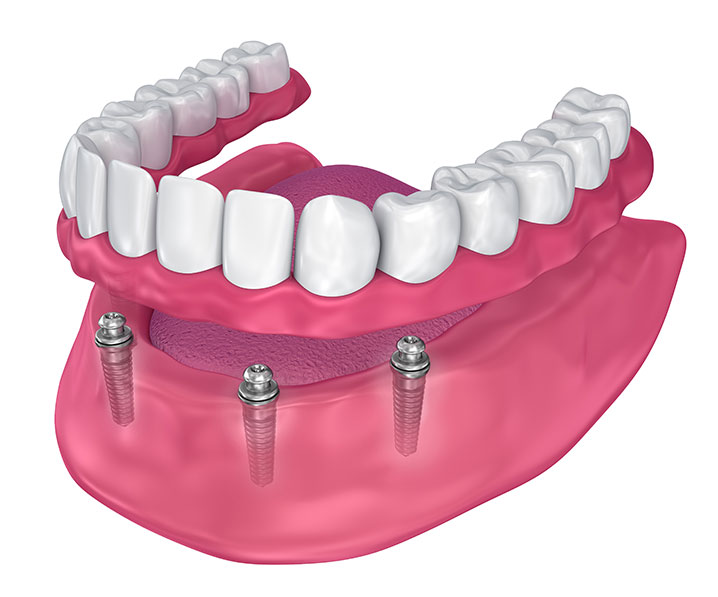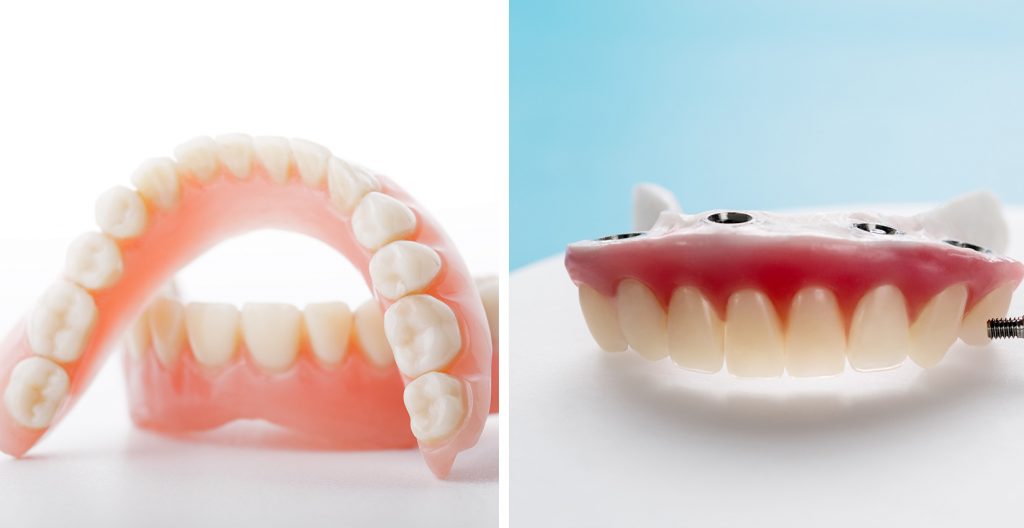If you are missing some of your natural teeth, you may be wondering what your best option for replacing them may be. When it comes to replacing missing teeth, there are two popular options: dentures and dental implants. Continue reading to learn which is best.
What are Dentures?
Many people are familiar with the general concept of dentures, but most are not aware of the specifics of this form of dental treatment.
Dentures are dental prosthesis that is designed to replace missing teeth inside the mouth. There are two types of dentures:
- Full Dentures: Designed for fully edentulous (no teeth on the entire arch) patients. Full dentures rest directly on top of the gums and are usually held in place with some form of denture adhesive.
- Partial Dentures: Partial dentures are designed for patients who are missing just a few teeth. This type of denture features clasps that hook tightly around “anchor” teeth in the mouth to hold the prosthesis in place.
Modern dentures are designed to be as comfortable and realistic-looking as possible. They can be easily removed and placed back inside the mouth, which makes it easy to care for and clean them on a daily basis.

Benefits of Dentures
Dentures have various benefits, including:
- More cost-effective than dental implants
- Prevent facial features from sagging
- Improved confidence and self-esteem
- Partial dentures prevent the remaining natural teeth in the mouth from shifting out of place
- Easy to remove for cleaning
- Fully customizable shape, size, and color of teeth
- Improve ability to speak and eat
Drawbacks of Dentures
While there are many benefits that come along with dentures, it is also important to remember that there are a few drawbacks, such as:
- Because there is nothing to retain bone density, denture paints usually experience some form of bone recession over time
- Some patients may have a hard time getting their dentures to stay firmly in place – even with denture adhesive
- Dentures require certain changes to lifestyle and diet – it is typically recommended to avoid biting straight into things (like sandwiches) and instead cut up food into small portions and chew with back teeth.
- Some patients experience an adjustment period in which their dentures rub against their gum tissues, causing sore spots
Who is a Candidate for Dentures?
Ideal candidates for full dentures are individuals who have lost their natural teeth but have retained good levels of bone structure in their jaw. Because full dentures rest on the gum line, they depend on a bit of retention that is presented by the underlying jaw bone. When a patient has experienced bone recession, they may find it extremely difficult to keep their dentures in place.
Ideal candidates for partial dentures are individuals who have lost a few natural teeth but have maintained the health and strength of the remaining teeth in the mouth. Since the clasps of the partial denture wrap around the natural teeth to provide stability, it is crucial that these “anchor” teeth are strong and healthy.
What are Dental Implants?

Dental implants are titanium devices that are placed into the jaw bone. They are designed to replace the roots of the natural tooth that has been lost; on top of the implant, a dental crown will be placed to fill the smile line.
Dental implants tend to be more expensive than traditional dentures, but it is important to keep in mind that they provide the closest possible imitation of a natural tooth, both aesthetically and physically. They also help prevent bone recession and require no alterations to be made to surrounding teeth.
Why Are Dental Implants The Best Choice?
Dental implants are widely regarded as the best option for replacing missing teeth – especially when compared with dentures.
Dental implants have a wide range of benefits, including:
- Replace and mimic missing natural tooth structure and functionality
- Prevent bone recession
- No changes to lifestyle or diet
- Improved confidence and self-esteem
- Implants last decades when well-cared for
Implants provide the closest imitation to a natural tooth – both in functionality and aesthetics. Perhaps one of the greatest beneficial aspects of a dental implant is that they look (and feel) just like a natural tooth. Rather than fussing with denture adhesive, potential sore spots, and future bone loss, patients with dental implants often forget that they have their treatment at all.
Drawbacks of Dental Implants
Dental implants can be very useful for replacing missing teeth, but there are a few drawbacks to consider, such as:
- Can be quite expensive when compared with the cost of dentures
- Some insurance plans may not cover costs, as implants are sometimes considered to be an “elective” treatment option
- Long healing period
Who is a Candidate for Dental Implants?
Because dental implants must be placed directly inside of the jaw bone, it is very important for the patient to have an adequate level of bone to support the implant. If there is not enough bone structure present, it is likely that the implant may fail.
It is also important that the gum tissues are healthy, as well; this will help encourage proper recovery. Patients with pre-existing gum disease may not qualify as candidates for dental implants.
To determine your candidacy for dental implants, your dental professional will conduct a thorough examination. In most cases, this examination will consist of a three-dimensional x-ray that will help determine just how much bone structure is present. If it is determined that you are not a candidate for dental implants, your alternative options – such as dentures – will be discussed with you at length.
Implant-Supported Dentures

Implant dentures are an alternative, “best of both worlds” option that provides patients with the ability to replace an entire arch of teeth while taking advantage of the strength, durability, and stability of dental implants.
All-on-4 dentures – as the name suggests – clip securely into place over the top of four dental implants which are placed into the patient’s jaw bone. Because the denture is secured with the dental implants, the dentures remain firmly in place and do not require the use of any denture adhesive.
Another added benefit of implant-supported dentures is protection against future bone recession, as the implants remain in the jaw bone and keep the bone in place.
Because of the positioning of the four implants, even patients with a bit of bone loss may qualify as candidates for implant dentures; a consultation with your dentist will help you determine if you are an ideal candidate.
Reza Dental Care: Dentures and Dental Implants in South Gate, CA
With the information you have learned here, you will have a better understanding of the debate of dentures versus dental implants. To determine which treatment method is right for you, it is best to have a consultation with your trusted dental professional.
Here at Reza Dental Care, we are proud to help our patients achieve the smile of their dreams by offering both denture and dental implant treatment in our South Gate office.
Above all, Reza Dental Care is here to help you maintain a healthy and beautiful smile; we are proud to provide comprehensive dental and orthodontic care in South Gate, California. Searching for the “best dentist near me”? Our team of professionals is here for you.
For more information about dentures vs dental implants or to schedule an appointment in our South Gate dental office, book an appointment online or give us a call at 323-457-8787.

 Available For Emergencies
Available For Emergencies